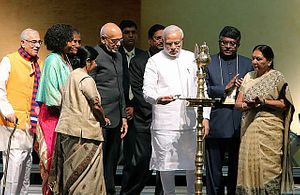With Prime Minister Narendra Modi in tow, India’s ruling Bharatiya Janata Party (BJP) held its annual national executive meeting in Bangalore last week, taking stock of the party’s performance over the last eleven months. But pressing matters also faced the BJP, as it determined how to respond to the Congress Party’s push on land acquisition reform. That debate assumes significance as perceptions of Modi, in contrast to the expectations that the prime minister generated in the run up to last year’s campaign, continue to lag.
Over the course of the meeting, the BJP tried to devise a strategy to deal with the perception gap. Farmers and impoverished Indians are particularly upset about the land acquisition bill, introduced in parliament during the budget session last month. Opposition to the bill has framed Modi as a sympathizer to the wealthy, claiming the bill would allow for the widespread land purchases, which industrialists could nab at bargain prices. With the Congress Party galvanizing opposition to the bill, the BJP’s views are increasingly perceived as “pro-corporate” and “anti-farmer” in opinion polls.
Being dubbed “pro-rich” is a losing proposition for any party in India. In his address to the party meeting, Modi drew upon his rural background. He made the case that land acquisition would benefit farmers and the poor, who would gain from industrialization and economic development. Modi deemed Congress a “pro-rich group,” working for the upper crust of Indian society.
The Telegraph’s Radhika Ramaseshan has termed Modi’s “pro-poor” pronouncement as the political equivalent of Stockholm Syndrome. Ramaseshan writes that the BJP “vowed to swap its pro-rich image for a pro-poor face–succumbing to the charms of the very model fashioned by the Congress that has been accused by the BJP of holding the country hostage all these years.”
It’s still anyone’s guess as to whether the BJP wins that battle of perceptions, but the party is much less surefooted today then when it formed the government a year ago.
The BJP promised during last year’s campaign that it would bring back illegal money stacked in foreign banks to India and distribute the wealth among the people. The government has not made much headway in that direction. Modi appears to be taking the same stand on the issue as the previous Congress government: he is unsure of the exact amount stored in foreign coffers and what it will take to bring the money back.
That was a very sensitive issue in the last year’s elections. Congress’s waffling on the issue cost the party dearly. The lack of concrete results on this front has also injured the BJP’s popularity.
The numbers show this. In an opinion poll conducted by India Today, the BJP shows declines across the board over the past ten months. The magazine says that voters have been upset by rising intolerance and violence against religious minorities, and blame Modi for his inability to reign in fringe elements of his party.
Modi’s popularity has come down sharply in the last year, falling by more than 20 percent since last August, one of the sharpest declines for any incumbent in his first year in office.
With the Congress Party sensing an opportunity to corner the BJP government on the land acquisition bill, Modi will have a tough time passing the crucial legislation in parliament, and countering the “anti-poor” and “anti-farmer” labels from the resurgent opposition. The BJP can’t match the economic populism of Congress, and retooling promises of reform will antagonize its core middle-class constituency, which provided resounding support for Modi last year.
Defeat in assembly elections in Delhi last month shook the confidence of the BJP. Those losses make the coming campaign in Bihar, at the end of this year, crucial for the party. The BJP has thrived on the image and appeal of Modi. A loss in Bihar would demoralize the ruling group, and make it tougher to continue the push for economic reform.
The way ahead for Modi will not be easy. While radical Hindu elements continue to dampen the image of the prime minister, his ambivalent pursuit of economic reform threatens to alienate middle-class voters.
Modi sailed into power by playing into the impatience of India’s youngest voters. Now, he could fall victim to that same anxiety. The time for tough talk is over. India wants results.

































